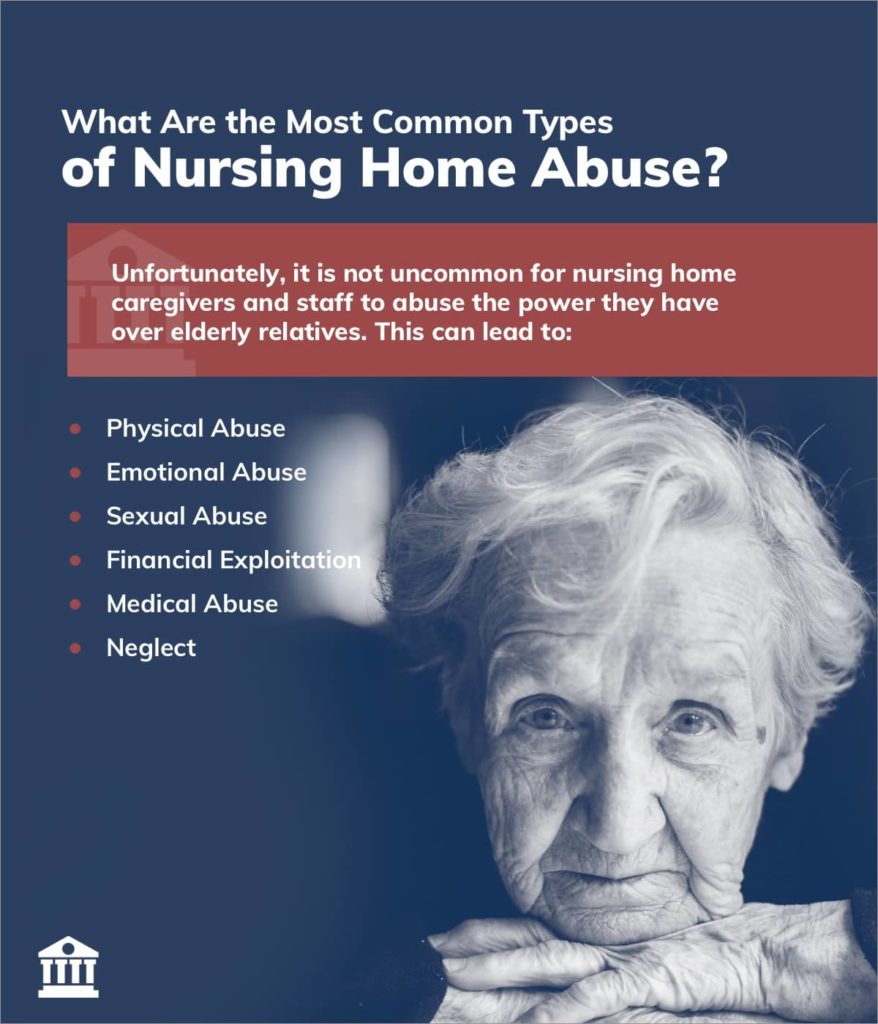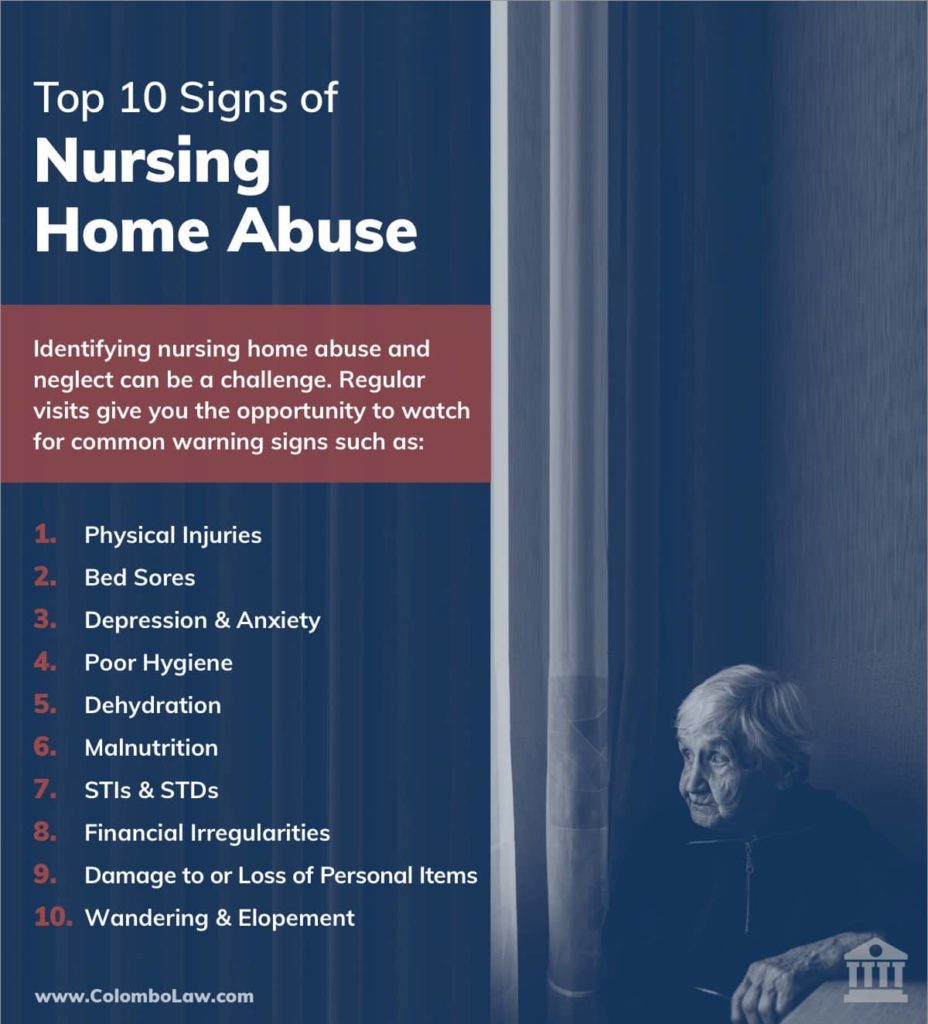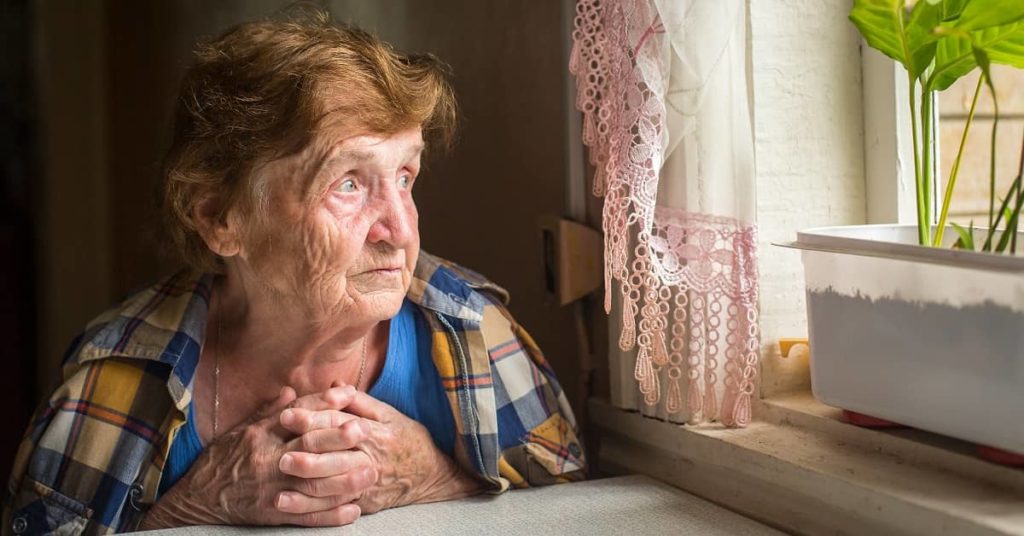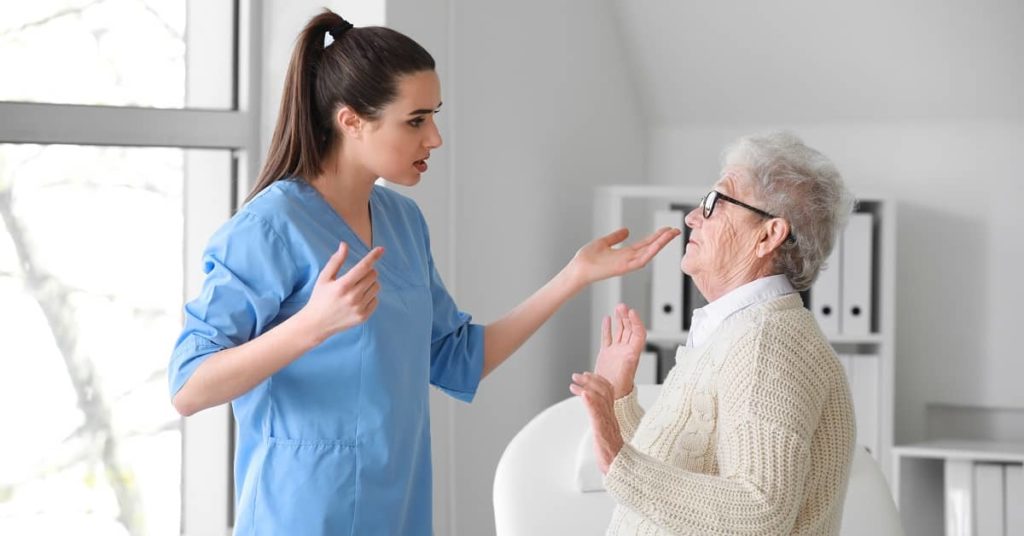Nursing Home Abuse Attorneys Serving Clients in Cincinnati & All of Ohio
Far too many seniors are abused or neglected by nursing home staff. A Cincinnati nursing home abuse lawyer can help if you or a family member has been mistreated in a care facility.
The aging population has created an urgent need for more nursing homes and long-term care facilities. Ohio has approximately 960 licensed or certified nursing homes, with 56 in Cincinnati alone. Despite extensive regulations by state and federal authorities, nursing homes don’t always uphold the standard of care their residents deserve. This can lead to serious and even deadly injuries.
A Cincinnati nursing home abuse attorney can help you and your family identify your legal rights and options. For a FREE case review, call Colombo Law at 513-599-8841 today.
Do You Have a Case? Let Us Help You!

What Type of Abuse Is Most Common in Nursing Homes?
The Ohio Department of Aging estimates that 200,000 seniors endure some form of abuse, many of them in nursing homes. Common types of nursing home abuse include:
Emotional Abuse
Psychological or emotional abuse is the most common way nursing home residents are mistreated. Examples include:
- Yelling at residents and/or using profanity
- Insults about a resident’s appearance, physical condition, gender, race and ethnicity, etc.
- Demeaning or belittling behavior, such as treating a resident like a child
- Refusing to speak to the resident
- Manipulating or controlling the resident’s behavior
- Isolation from caregivers, other residents, and friends and family
- Denying the resident food, medicine, and other necessities
- Threats of physical or sexual violence
Physical Abuse
In one survey, nearly one-quarter of respondents with an elderly loved one in a nursing home reported at least one instance of physical abuse. Seniors are extremely vulnerable to injury, making any instance of physical abuse a major cause for concern.
Examples of physical abuse in nursing homes include:
- Slapping, hitting, or punching
- Kicking
- Pushing and shoving
- Beating residents with objects
- Grabbing or forcefully handling the resident
- Improper or unnecessary use of physical restraints
- Overmedication to control the resident (chemical restraint)
Financial Abuse
Sadly, it is not uncommon for unscrupulous nursing home staff and caregivers to take advantage of residents’ vulnerable state for their own financial gain. Accordingly, financial abuse can be the most difficult to detect.
Examples of financial abuse and exploitation in nursing homes include:
- Stealing money from residents’ wallets or purses
- Theft of personal belongings from residents’ rooms
- Forging a resident’s signature on checks and financial documents
- Unauthorized use of a resident’s debit or credit cards
- Fraudulent bank transactions
- Stealing a resident’s identity
- Manipulating or coercing a resident into adding the abuser to their will, granting them power of attorney, etc.
Neglect
Whether intentional or not, neglect can lead to serious adverse effects for nursing home residents’ physical and psychological well-being. Common examples of nursing home neglect include:
- Failure to provide residents with food and water
- Medication errors, such as failing to adhere to the resident’s prescribed medication regimen, administering the wrong medication or dosage, etc.
- Not assisting residents with daily hygiene activities (grooming, bathing, etc.)
- Unsanitary conditions in resident rooms and common areas
- Lack of care when moving residents or assisting them with mobility
- Disregarding special requirements and needs of patients with conditions such as dementia, diabetes, physical limitations, etc.
- Negligent supervision of nursing home staff
- Inadequate security of the premises
Sexual Abuse
Any type of non-consensual sexual contact is considered sexual abuse or assault. Examples of nursing home sexual abuse include:
- Unwanted touching, such as groping, fondling, or pinching
- Sexual harassment, including inappropriate comments and gestures
- Exposing oneself to residents and/or forcing residents to remove clothing
- Sexual assault and rape
Nursing home residents should be able to feel safe. Tragically, abuse and neglect are common—and very serious issues—in nursing homes, assisted living facilities, rehabilitation centers, and other facilities providing long-term care. A Cincinnati nursing home abuse lawyer can help families pursue justice and fair compensation for their losses.
Contact Colombo Law for FREE Today
Signs of Nursing Home Abuse or Neglect
Nursing home abuse often goes unreported. This is often due to a combination of factors, including fear, embarrassment, lack of capacity, and more. Family members need to know what to look for and how to report suspected abuse.
Potential signs of nursing home abuse include:
- Bed sores
- Malnutrition
- Dehydration
- Poor personal hygiene and/or unclean living conditions
- Unexplained injuries such as cuts, bruises, bone fractures, etc.
- Marks indicative of restraint, such as bruising around the wrists and ankles
- Burn injuries from cigarettes and other objects
- Fear, anxiety, and depression, especially in the presence of certain staff members
- Withdrawal from social activities, seeing visitors, etc.
- Missing cash and personal items
- Unexplained banking activities
- STDs, bruising of the genitals, and other signs of sexual assault
- Wandering around the facility or leaving the facility
These and other issues are not always caused by neglect or abuse. Nonetheless, they should always be taken seriously by caregivers and loved ones. Seniors may be seriously injured or experience a decline in their health if abuse goes undetected.
In extreme cases, nursing home abuse and neglect may result in the death of the resident. A skilled nursing home abuse attorney can pursue a wrongful death claim on your family’s behalf for the untimely loss of your relative.

What Rights Do Nursing Home Residents Have?
Nursing home residents’ rights are enumerated in Ohio Revised Code § 3721.13. They include, but are not limited to:
- A clean, safe place to live
- Freedom from abuse
- Proper medical care “consistent with the program for which the resident contracted”
- The right to make and participate in decisions concerning their health
- Privacy and confidentiality of personal information and medical records
- Freedom from physical or chemical restraints (unless restraints are necessary for the safety of the resident and/or others)
- Access to social, recreational, and educational opportunities
- Generally, the right to “private and unrestricted communications with the resident’s family, social worker, and any other person”
- The right to one’s own clothing and belongings
All nursing homes in Ohio are required to provide staff members with the training needed to uphold and protect the rights of residents. Unfortunately, issues such as lack of training and inadequate supervision are common. This can lead to systemic violation of residents’ rights, including nursing home abuse and neglect. indicate that the nursing home is neglecting your loved one’s physical health and medical needs.

When Is a Nursing Home Liable for Abuse?
Generally speaking, nursing homes can be held liable for instances of neglect or abuse committed by an employee. It is also important to identify negligence on the part of the facility.
Common issues that lead to abuse or neglect for which a nursing home may be held responsible include:
- Understaffing: Nursing homes across the country are chronically understaffed. When a facility doesn’t have enough staff, the potential for neglect and abuse rises sharply.
- Negligent hiring practices: Failure to evaluate potential employees (such as checking qualifications, performing background checks, etc.) can result in the hiring of unqualified or dangerous individuals.
- Improper training: Residents’ health and safety are at risk when nursing homes fail to provide employees with proper training and/or neglect to put procedures and policies in place.
- Negligent supervision: Supervising employees is essential for preventing abuse and neglect. Without it, employees may mistreat residents—and get away with it.
- Failure to report abuse: Nursing home administrators and caregivers are required by law to report known or suspected abuse. Both the negligent professional(s) and the facility may be held liable for failing to report the abuse, neglect, or exploitation of a resident.
- Negligent security: Missing or inadequate security measures can lead to people unlawfully accessing the premises and harming a resident. Wandering and elopement may also occur if there is insufficient security to keep residents (who may be cognitively impaired) from leaving the home.
Nursing homes have specific duties under Ohio law. They are also subject to extensive federal regulations. A knowledgeable Cincinnati nursing home abuse attorney can navigate these complex laws, regulations, and rules and hold the facility accountable for violations that caused your loved one harm.

Proving Nursing Home Abuse or Neglect
Given their reluctance or refusal to report abuse, it can be difficult to prove that a resident is being neglected or abused. Once you have gotten your loved one to safety, we strongly suggest seeking legal counsel as soon as possible.
A Cincinnati nursing home abuse lawyer can investigate promptly to ensure all relevant evidence is preserved. Potential evidence in a nursing home abuse claim may include:
- The resident’s medical records
- Photos of conditions at the home and/or pictures of your loved one’s injuries
- Witness statements
- Video footage of the abuse or neglect (if available)
- Personnel records for the facility
- Financial records (if financial abuse or exploitation is suspected)
- Copies of complaints filed with the nursing home, as well as incidents reported to the authorities (such as the local police, the Ohio Department of Health, etc.)
- Inspection reports for the nursing home
One of the very best ways to prove nursing home abuse is through your own observations and impressions. If you have concerns about the way your loved one is being treated, start taking detailed notes of what you see and your experience interacting with the nursing home staff, administration, and other residents.
Experienced lawyers will take your notes and testimony, the documentary evidence, and more to prepare a strong case on your behalf. They may also consult expert witnesses to elucidate issues of liability, damages, and more.




Compensation for Nursing Home Abuse
Both the victims of nursing home abuse and their families may be entitled to significant compensation. Damages that may be available include:
- Current and future medical expenses
- The cost of therapy and rehabilitation
- Pain and suffering
- Emotional anguish
- Permanent disability, scarring, and disfigurement
- Loss of income
- Other economic losses, such as the cost of relocating a resident, purchase of medical equipment, etc.
- Resident’s loss of the enjoyment of life
- Punitive damages, in select cases
Nursing home abuse can take a serious toll on residents and their loved ones. Seniors may experience severe physical and psychological injuries, while their families are left emotionally devastated by the ordeal. Monetary compensation can’t erase abuse or neglect, but it can help you and yours overcome the financial losses and regain some peace of mind.

Have You Been Injured ? Call or Chat with Us Now.
Contact a Cincinnati Nursing Home Abuse Lawyer
At Colombo Law, personal injury cases make up 100% of our practice. We exclusively represent people who have been injured through no fault of their own. Our attorneys and staff are passionate about pursuing maximum compensation for clients, whether through settlement or by going to trial.
If your loved one has been neglected or abused in a nursing home, call Colombo Law at 513-599-8841 today for a FREE case review. We serve clients in Cincinnati and throughout Ohio.










